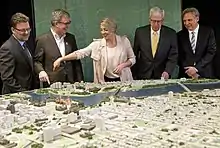National Capital Commission
The National Capital Commission (NCC; French: Commission de la capitale nationale, CCN) is the Canadian Crown corporation responsible for development, urban planning, and conservation in the National Capital Region (Ottawa, Ontario and Gatineau, Quebec), including administering most lands and buildings owned by the Government of Canada in the region. The NCC reports to the Parliament of Canada through whichever minister in the Cabinet of Canada is designated responsible for the National Capital Act, currently the Minister of Canadian Heritage.
 The National Capital Commission's logo since 1999 | |
Native name | Commission de la capitale nationale |
|---|---|
| Type | Crown corporation |
| Industry | Property management, urban planning |
| Predecessor | Federal District Commission |
| Founded | 1959 |
| Headquarters | 202–40 Elgin Street, , Canada |
Area served | National Capital Region |
Key people |
|
| Owner | Government of Canada |
Number of employees | 419 (2017[2]) |
| Website | ncc-ccn |
History
The NCC was created by Parliament of Canada in 1959 through the National Capital Act to succeeded the former Federal District Commission (FDC), which has been established in 1927. The FDC, which itself had replaced the earlier Ottawa Improvement Commission created in 1899, had repeatedly failed to convince municipal governments to cooperate in planning efforts regarding the National Capital Region.[lower-alpha 1] The National Capital Act gives the NCC statutory authority to implement its plans, an authority confirmed by the Supreme Court of Canada's ruling in Munro v National Capital Commission.[3]
After the 2006 elections, the Government of Canada asked for a formal review of the mandate of the NCC. A panel conducting the review, in its report, suggested that the Crown Corporation needed more money and should become more transparent.[4]
Organization

The NCC is the responsibility of the Minister of Public Works and Procurement, currently Anita Anand.[5] It is governed by the National Capital Act,[6] which explains the boundaries of the National Capital Region in great detail. Its headquarters are in the Chambers Building on Elgin Street, between Queen and Sparks Streets.
In the 28th Canadian Ministry, under Stephen Harper the NCC reported to Parliament through the Minister of Foreign Affairs,[7][8] and then through senior Ottawa-area cabinet ministers, the last of whom was Pierre Poilievre.[9]
Since April 2016, the mayors of Ottawa and Gatineau have held non-voting ex officio seats on the board.[10]
Chairpersons and CEOs (before 2008's amendment)
- 1952–1959: Major General Howard Kennedy
- 1959–1961: Alan K. Hay
- 1961–1967: Lieutenant General Samuel Findlay Clark
- 1967–1969: A. John Frost
- 1969–1973: Douglas H. Fullerton
- 1973–1976: Edgar Gallant
- 1976–1977: Pierre Juneau
- 1978–1985: Charles Mills Drury
- 1985–1992: Jean Elizabeth Morrison Pigott
- 1992–2006: Marcel Beaudry
Chairpersons
- 2007–2017: Russell Andrew Mills
- 2017–present: Marc Seaman[1]
Role

The role of the NCC is to champion the interests of Ottawa, Gatineau and surrounding region as the nation's capital, typically with regard to issues of national interest, such as the location of monument and museum sites, and major streetscapes such as Confederation Boulevard.
The objects and purposes of the NCC are "to prepare plans for and assist in the development, conservation and improvement of the National Capital Region in order that the nature and character of the seat of the Government of Canada may be in accordance with its national significance."[16]
With 11% of the area’s landmass, the NCC is the largest landowner in Canada’s Capital Region. Its assets include:
- Gatineau Park
- the Greenbelt
- the Rideau Canal Skateway
- urban lands and parks (e.g. Major’s Hill Park, Jacques-Cartier Park, Commissioners Park)
- Capital Pathway
- scenic parkways (e.g. Sir John A. Macdonald Parkway, Sir George-Étienne Cartier Parkway)
- real property
- heritage buildings
- agricultural and research facilities
- and commemorative monuments (e.g. National Holocaust Monument, Royal Canadian Navy Monument)
The NCC is also the steward of the Capital’s six official residences: Rideau Hall, 24 Sussex Drive, Harrington Lake, Stornoway, The Farm and 7 Rideau Gate.
The continuing preservation, evolution and management of Confederation Boulevard, the ceremonial route linking key attractions in National Capital Region, on both sides of the Ottawa River, in Ottawa as well as Gatineau, Quebec, are the responsibility of the NCC and its partners.
These roles are in contrast with the mandates of the various municipal governments, which serve the benefit of their immediate resident, under provincial legislation, on issues like road maintenance, sewer, water and public transport.
The Government of Canada is the largest employer and largest landowner in these two areas, and the NCC thus has a great deal of influence over the cities. This has sometimes been criticized by city officials from Ottawa and Gatineau for a lack of cooperation, such as in 1998 when the NCC proposed levelling a large strip of downtown Ottawa to build a ceremonial boulevard along the city's existing Metcalfe Street.
Over the last thirty years, the activities of the NCC have been denounced or castigated by several Quebec governments. They considered municipal affairs to be a purely provincial jurisdiction, according to the constitution of Canada. Others have criticized the group for what they perceive to be poor or misguided planning decisions.[17]
See also
References
- "Marc Seaman". National Capital Commission. Government of Canada. Retrieved April 23, 2020.
- "About Us". National Capital Commission. Government of Canada. Retrieved 23 April 2020.
- See Munro v. NCC, Supreme Court of Canada, 1966.
- Sun Media (December 22, 2006). "NCC needs $25M more yearly : Panel". 24 Hours.
- Branch, Legislative Services (2019-11-20). "Consolidated federal laws of canada, Order Designating the Minister of Public Works and Government Services as the Minister for the purposes of that Act". laws-lois.justice.gc.ca. Retrieved 2020-08-17.
- Branch, Legislative Services. "Consolidated federal laws of canada, National Capital Act". laws-lois.justice.gc.ca. Retrieved 6 March 2018.
- "Budget 2012". 2012-03-29. Retrieved 2012-03-29.
- Branch, Legislative Services. "Consolidated federal laws of canada, Order Designating the Minister of Foreign Affairs for the Purposes of the National Capital Act". laws-lois.justice.gc.ca. Retrieved 6 March 2018.
- McGregor, Janyce (7 November 2015). "Justin Trudeau's cabinet: 6 changes found in the fine print". CBC News. Retrieved 7 November 2015.
- Porter, Kate (April 11, 2016). "Ottawa, Gatineau mayors gain seats at NCC table". Retrieved April 23, 2020.
- "Micheline Dubé – French for the future". Retrieved 2019-02-04.
- Communications, Government of Canada, Public Services and Procurement Canada (2018-02-20). "Deputy Minister of Public Services and Procurement and Deputy Receiver General for Canada Canada - About PSPC - PSPC". www.tpsgc-pwgsc.gc.ca. Retrieved 6 March 2018.
- Feb 03, CBC News · Posted; February 3, 2014 10:56 AM ET | Last Updated; 2014. "Mark Kristmanson named CEO of National Capital Commission | CBC News". CBC. Retrieved 2019-02-04.CS1 maint: numeric names: authors list (link)
- Commission, National Capital (6 March 2018). "Dr. Mark Kristmanson - National Capital Commission". National Capital Commission. Retrieved 6 March 2018.
- Heritage, Canadian. "Minister Rodriguez Announces the Appointment of Tobi Nussbaum as the Next Chief Executive Officer of the National Capital Commission". www.newswire.ca. Retrieved 2019-02-04.
- Branch, Legislative Services. "Consolidated federal laws of canada, National Capital Act". laws-lois.justice.gc.ca. Retrieved 2018-03-06.
- Ken Rubin in The Ottawa Citizen, 15 June 1998.
- Legislation
- National Capital Act, Revised Statutes of Canada (1985, c. N-4).
Notes
- See Gibson J., NCC v. Munro, Court of the Exchequer, 1965.
